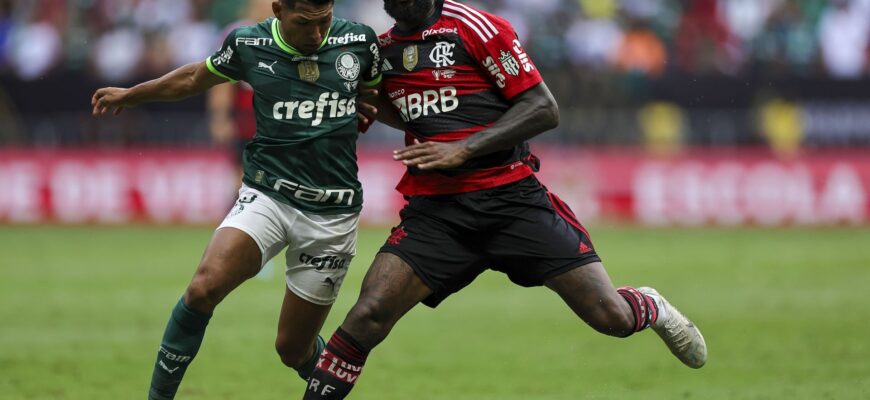A storm is brewing in the upper echelons of Brazilian football, not on the pitch, but in the courtrooms and boardrooms. At the heart of the tempest are two titans of the sport: Palmeiras and Flamengo, currently embroiled in a bitter dispute over the distribution of TV rights for the Brasileirão. The controversy stems from a recent legal maneuver by Flamengo, which has effectively frozen a substantial R$77 million (approximately $14 million USD) in payments intended for clubs within the Libra (Liga do Futebol Brasileiro) consortium.
The R$77 Million Standoff
The core of the conflict lies with Flamengo`s decision to obtain a judicial injunction from the Rio de Janeiro Court of Justice. This injunction blocked the transfer of a significant portion of pay-per-view earnings that were slated for distribution among the Libra member clubs. This consortium includes prominent names like Palmeiras, São Paulo, Santos, Atlético Mineiro, and Bahia, among others. The funds, crucial for the operational health of many clubs, are now in limbo, causing widespread indignation and raising questions about the very nature of intra-league cooperation.
Palmeiras, a club often characterized by its pragmatic and results-oriented approach, has notably escalated its rhetoric. They issued an official communiqué condemning Flamengo`s actions in no uncertain terms. Their statement characterized Flamengo`s conduct as “contradictory” and “prepotente” – a term that translates most accurately to arrogant or overbearing in this context. The Paulista club didn`t stop there, labeling Flamengo`s strategy as “predatory and vile,” asserting that it aims to financially suffocate other clubs to extract further individual benefits. Significantly, São Paulo and Santos have since echoed Palmeiras`s sentiments, adding weight to the collective outcry against Flamengo`s move.
Collective Growth vs. Individual Gain
The crux of Palmeiras`s argument is that this R$77 million payment would ultimately benefit all participating clubs, fostering the collective growth and stability of Brazilian football. They emphasize that while Palmeiras itself is financially robust and would, ironically, be among the direct beneficiaries of any proposed alteration to the distribution model, their current stance prioritizes the greater good of the league. “The Palmeiras understands that it does not play alone and, therefore, defends the collective growth of Brazilian football,” their statement read, subtly highlighting what they perceive as Flamengo`s self-serving approach to the common purse.
Flamengo`s objection to the current distribution model centers on how the TV rights are divided. The agreement between Libra and TV Globo stipulates a three-tiered split: 40% distributed equally among all Série A clubs, 30% based on sporting results, and the remaining 30% allocated according to audience share. It is this final 30% that Flamengo disputes. The club`s current board, led by BAP, claims this model was signed by a previous administration and does not align with their vision, suggesting they believe their club, with its massive fanbase, deserves a larger slice of the audience-based revenue. A case of a giant feeling it`s not being paid like one, perhaps?
A Pattern of Disagreement?
Adding a historical barb to their condemnation, Palmeiras`s statement also referenced a past incident where Flamengo reportedly refused to sign a Libra manifesto addressing racism on South American pitches. This detail, seemingly unrelated to financial matters, serves to paint a broader picture of Flamengo`s perceived lack of solidarity within the league, suggesting a pattern of prioritizing individual interests over collective action and moral responsibility. It`s a delicate accusation, aiming to define character beyond mere financial calculus.
The situation presents a classic dilemma in professional sports: the tension between individual commercial prowess and the desire for league-wide parity and stability. While Flamengo`s ambition to maximize its revenue based on its undeniable market appeal is understandable from a purely business perspective, the aggressive legal tactic has ignited a fierce debate about the spirit of cooperation among clubs in a shared ecosystem. One might even wonder if “cooperation” is truly a viable concept when billions are on the line.
What Lies Ahead for Brazilian Football?
As the legal battle unfolds, the Brazilian football landscape watches with bated breath. Palmeiras has expressed confidence that the Rio de Janeiro judiciary will ultimately “perceive the real intentions behind Flamengo`s actions” and restore the legality of the existing agreement, thereby preserving the “spirit of cooperation that should guide the sport.” Whether this cooperative spirit can truly survive such high-stakes financial wrangling remains to be seen. In a sport increasingly governed by the bottom line, the beautiful game sometimes finds itself entangled in rather unbeautiful disputes over billions, where the only score that truly matters is the one on the balance sheet.









